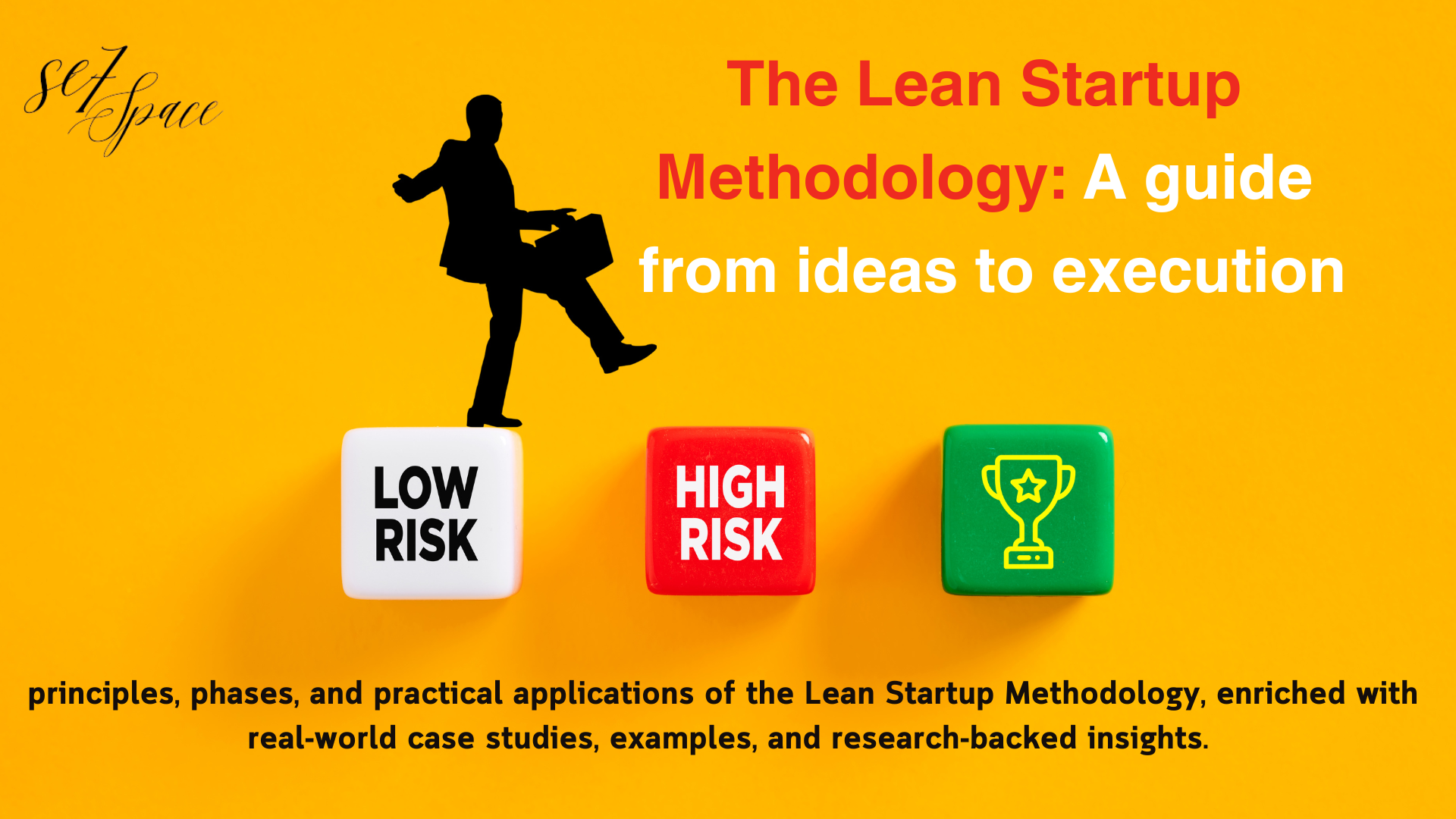In the fast-paced world of startups, having a brilliant idea is just the beginning. The real challenge lies in turning that idea into a successful, sustainable business. In the dynamic landscape of entrepreneurship, transforming an idea into a thriving business requires more than just creativity—it demands strategic vision, iterative development, and relentless adaptation. This is where the Lean Startup Methodology comes into play, offering a proven framework that empowers startups to navigate uncertainty, minimize risk, and accelerate growth through a process of continuous innovation and validated learning.
Understanding the Lean Startup Methodology
The Lean Startup Methodology, popularized by Eric Ries, advocates for a systematic approach to building and growing startups through continuous innovation and validated learning. At its core, it emphasizes the importance of agility, experimentation, and customer-centricity. By focusing on delivering value to customers while minimizing waste, startups can increase their chances of success in a competitive market landscape.
The Lean Startup Model
At its core, the Lean Startup Model is designed to help startups maximize efficiency and minimize waste through a structured approach to product development and growth. At the heart of the Lean Startup Methodology lies a structured framework comprising several key components:
- Start with a Vision: Every successful startup begins with a compelling vision. However, it’s essential to translate this vision into actionable goals and objectives, grounded in a deep understanding of customer needs and market dynamics.
- Build a Minimum Viable Product (MVP): Instead of investing time and resources into developing a fully-featured product, startups should create a Minimum Viable Product—a basic version that allows them to test their assumptions and gather feedback from early adopters.
- Measure and Learn: The Lean Startup advocates for a data-driven approach, where startups continuously measure key metrics and gather feedback from customers to validate their assumptions and iterate on their product or service.
- Pivot or Persevere: Based on the insights gained from customer feedback and market validation, startups should be willing to pivot—make strategic changes to their product, strategy, or business model—or persevere if they’re on the right track.
- Scale Up: Once product-market fit is achieved, startups can focus on scaling up their operations while maintaining a relentless focus on delivering value to customers and driving sustainable growth.
Principles of Lean Startup
The principles of Lean Startup are not just theoretical concepts—they’re actionable guidelines that drive decision-making and inform strategic direction. By adhering to key principles and embracing a cyclical process of iteration, startups can increase their chances of success in a highly competitive market landscape.
- Entrepreneurial Management: This principle emphasizes the importance of embracing uncertainty and managing risk effectively. Instead of relying solely on intuition or gut feelings, entrepreneurs should adopt a systematic approach to entrepreneurship, leveraging experimentation and validated learning to make informed decisions.
- Validated Learning: Validated learning involves testing assumptions and hypotheses through rapid experimentation to gather empirical evidence and insights. By conducting lean experiments and measuring outcomes, startups can validate their assumptions, iterate on their ideas, and refine their strategies based on real-world feedback.
- Build-Measure-Learn: The Build-Measure-Learn loop is a fundamental concept in Lean Startup, emphasizing an iterative approach to product development. Startups build a Minimum Viable Product (MVP), measure its performance using actionable metrics, and learn from customer feedback to inform the next iteration. This iterative cycle enables startups to incrementally improve their products or services while minimizing waste and maximizing value delivery.
- Innovation Accounting: Innovation accounting involves measuring progress using actionable metrics that reflect the true value delivered to customers, rather than vanity metrics that provide little insight into the health of the business. By focusing on outcomes rather than outputs, startups can gauge the effectiveness of their experiments and make data-driven decisions about resource allocation and strategy.
- Minimum Viable Product (MVP): The concept of the Minimum Viable Product (MVP) is central to Lean Startup, advocating for the development of the simplest version of a product or service that enables validated learning and early market feedback. By launching an MVP quickly and cost-effectively, startups can test their ideas, validate assumptions, and gather feedback from real users, reducing the risk of investing resources in unproven concepts.
These principles collectively provide a roadmap for startups to navigate uncertainty, mitigate risk, and accelerate growth through a process of continuous innovation and validated learning.
The Lean Startup Phase
- Ideation: During the ideation phase, entrepreneurs brainstorm and refine their business concepts, identifying key assumptions and hypotheses to be tested. The goal is to generate innovative ideas and hypotheses that address real market needs and opportunities.
- Validation: Through rapid experimentation and customer feedback, startups validate their assumptions and refine their value proposition, ensuring alignment with market needs. By building prototypes, launching Minimum Viable Products (MVPs), and conducting lean experiments, startups can gather empirical evidence to validate their assumptions and refine their value proposition.
- Execution: The execution phase involves building and launching the Minimum Viable Product, focusing on speed, agility, and iterative development. Startups prioritize delivering value to early adopters and gathering feedback to inform further iterations.
- Scaling: Once product-market fit is achieved, startups scale their operations and customer acquisition efforts, driving sustainable growth while maintaining a focus on delivering value to customers. Scaling requires a careful balance between growth and sustainability.
Case Studies of Lean Startup Success:
Let’s examine some compelling case studies that illustrate the application of Lean Startup principles in action:
- Dropbox: Drew Houston’s vision for Dropbox began with a simple problem: the difficulty of accessing files across multiple devices. By launching a Minimum Viable Product (MVP) and iterating based on user feedback, Dropbox quickly gained traction and became a household name in cloud storage.
- Instagram: Initially launched as a location-based check-in app called Burbn, Instagram pivoted to focus exclusively on photo-sharing after observing user behavior. This strategic pivot proved to be a game-changer, propelling Instagram to become one of the most popular social media platforms globally.
- Airbnb: Founded in 2008 by Brian Chesky, Joe Gebbia, and Nathan Blecharczyk, Airbnb began as a platform for renting out air mattresses in their apartment to generate extra income. Through rapid experimentation and iterative development, Airbnb evolved into a global hospitality giant, revolutionizing the way people travel and book accommodations.
- Uber: Travis Kalanick and Garrett Camp’s vision for Uber was born out of frustration with traditional taxi services. By launching a simple MVP—a mobile app that connected riders with drivers—Uber quickly gained traction and disrupted the transportation industry worldwide.
- Zappos: Tony Hsieh’s vision for Zappos was to create an online shoe retailer that offered exceptional customer service. By focusing on delivering a delightful customer experience and iterating on their service model, Zappos became synonymous with customer satisfaction and loyalty, ultimately leading to its acquisition by Amazon.
Implementing Lean Startup in Your Business
Implementing Lean Startup principles effectively in your business involves a holistic approach that encompasses strategy, culture, and execution. Here are some strategies for implementing Lean Startup in your business:
- Customer Discovery: Prioritize customer discovery and validation, engaging directly with your target audience to understand their needs, pain points, and preferences. Techniques such as customer interviews, surveys, and observational research can provide valuable insights into customer behavior and preferences.
- Lean Experimentation: Embrace a culture of experimentation, where failure is seen as an opportunity to learn and iterate. Test assumptions rigorously through lean experiments, focusing on actionable insights and iterative improvement. Encourage teams to test assumptions rigorously through lean experiments, focusing on actionable insights and iterative improvement. Rapid prototyping, A/B testing, and MVP development are valuable tools for validating hypotheses and gathering customer feedback.
- Iterative Development: Adopt an iterative approach to product development, releasing small, incremental updates based on customer feedback and market validation. Embrace a mindset of continuous improvement, where feedback from customers and stakeholders informs every aspect of the product development process.
- Feedback Loops: Establish feedback loops to gather real-time feedback from customers, enabling continuous improvement and refinement of your product or service. Leverage data analytics, user testing, and customer feedback platforms to gather insights into customer preferences, pain points, and behaviors.
- Adaptability: Remain flexible and adaptable in the face of changing market conditions and customer feedback. Be willing to pivot if necessary, adjusting your strategy and tactics to better align with evolving customer needs and preferences. Encourage a culture of innovation and adaptability, where teams are empowered to experiment, take risks, and challenge the status quo.
By implementing Lean Startup principles effectively in your business, you can increase your agility, reduce risk, and accelerate growth by focusing on delivering value to customers and fostering a culture of continuous innovation and improvement.
The Lean Startup Methodology offers a practical framework for startups to navigate uncertainty, mitigate risk, and accelerate growth through a process of continuous innovation and validated learning. By embracing the principles of Lean Startup and applying them rigorously, entrepreneurs can increase their chances of success in today’s competitive landscape. Whether you’re launching a new venture or seeking to innovate within an existing organization, the Lean Startup Methodology provides a roadmap for achieving sustainable growth and driving meaningful impact.




